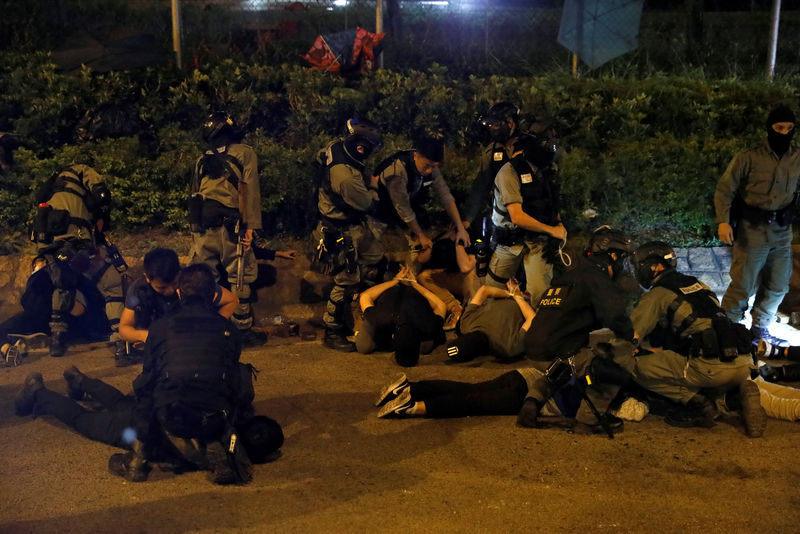By Marius Zaharia and Jessie Pang
HONG KONG (Reuters) - Anti-government protesters holed up in a Hong Kong university searched for escape routes on Tuesday after more than two days of clashes with police, dramatic breakouts by rope and motorcycle and more than 1,000 arrests in 24 hours.
About 100 protesters were trapped in the Polytechnic University a day after students, some tired and fearful of police storming the campus, tried again and again to flee, only to be beaten back by police firing rubber bullets, water cannon and tear gas.
Some 235 injured were taken to hospital on Tuesday, the Hospital Authority said.
"I just want to leave. I feel very tired," said Thomas, 20, a student at another university who has been on the campus since the siege began. "I didn't throw Molotovs. I was here to support the protest."
He then walked slowly, with about 10 others, towards police, who searched and arrested him. He had the phone numbers of lawyers written on his right forearm.
Late in the evening, another small group tried to run for it through the main gate. Most, if not all, ended up running back into the campus as police shouted at them and flashed their torches rather than firing.
Police said nearly 800 people had left the campus peacefully by 11 p.m. (1500 GMT) and would be investigated, including nearly 300 under the age of 18. About 20 volunteer medics had also left.
About 1,100 people had been arrested in the past 24 hours on charges including rioting and possession of offensive weapons, police added. The total since citywide protests began in June is more than 5,000.
Hong Kong leader Carrie Lam said she hoped the stand-off could be resolved and she had told police to handle it humanely.
Lam spoke shortly after the Chinese-ruled city's new police chief urged the support of all citizens to end more than five months of unrest triggered by fears that China's central government is stifling the former British colony's special autonomy and freedoms, including its independent judiciary.
China says it is committed to the "one country, two systems" formula, under which Hong Kong returned to Chinese rule in 1997, and has accused foreign countries of inciting trouble.
The unrest poses the gravest popular challenge to Chinese President Xi Jinping since he came to power in 2012.
'I'M IN TROUBLE'
Hundreds of protesters fled from the university or surrendered overnight and on Monday amid running battles on nearby streets, where demonstrators threw petrol bombs and rocks at police. Some made it out by rope and motorcycle.
"Some rioters were seen escaping by abseiling off a footbridge to getaway vehicles below," police said in a statement. "Our officers gave chase and were able to interrupt 37 of them, including the drivers."
About a dozen tried and failed to flee through the university's sewers. A Reuters witness saw them lower themselves into a tunnel wearing gas masks and plastic sheets, but the tunnel was too narrow. There were rumours others had made it by the same route on Tuesday.
"I feel I'm in trouble," said a 22-year-old who gave his name as Marcus, sitting with two friends in the campus canteen at a table piled with dirty dishes and plastic cups.
"We keep trying to think how to escape, but every time we pick a spot we see many police nearby. But if we give up, we're finished."
In the campus central square, a giant "SOS" call for help was spelled out in pink, blue and yellow bath towels.
One woman said her son was inside the campus with his girlfriend and they would come out but for the fear of facing charges of rioting, which can carry a 10-year sentence.
"I know the young people see there are many unrighteous things in society, they want to do something to change it," said the woman, who gave her name as Chan, 50. "But as parents, we only have one wish. We only want all of them to come home safely."
The university is the last of five that protesters have occupied to use as bases from which to disrupt the city, blocking the Cross-Harbour Tunnel outside and other arteries.
Lam said her government was very much on the "reactive side" in dealing with the protests but she did not rule out more violence even as she urged peace. Lam said she had been shocked that campuses had been turned into "weapons factories".
In what many will see as an illustration of Beijing's tightening grip, China's legislature questioned the legality of a Monday Hong Kong court ruling that a ban on face masks worn by protesters was unlawful.
The National People's Congress said Hong Kong courts had no power to rule on the constitutionality of city legislation.

The Hong Kong Bar Association, representing barristers, said the comments undermined the "the high degree of autonomy granted to (Hong Kong) under the Basic Law", the mini-constitution that sets the ground rules for Hong Kong after its return to Chinese rule.